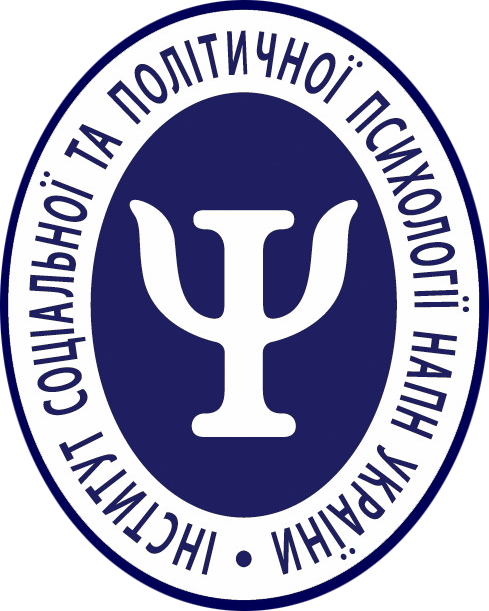
About department:
Laboratory was established in 2006 as the first Ukrainian scientific division that conducts a research on media culture of youth and adults. The Laboratory works on developing and implementing new methodologies and practices of media education in teaching and learning.
Our work is based on a theoretical-methodological base established by research on the Ukrainian informational sphere that was regularly conducted by ISPP since 1994 under the supervision by Director, NAES corresponding member Mykhola Slyusarevskyy.
The laboratory team researches sociopsychological aspects of mass communication, organization of media education of youth, formation of psychological barriers to socially destructive information, and readiness for effective interaction with informational space.
http://mediaosvita.org.ua/pro-nas/
Department staff:
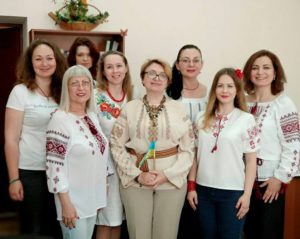
Lyubov Naydonova – Head of Research and Development, Corresponding Member of the National Academy of Educational Sciences of Ukraine, Doctor of Psychological Sciences
Nataliia Cherepovska, PhD (Psychology), Senior Researcher – Head of the Laboratory
Olenа Voznesenska, PhD (Psychology), Senior Researcher – Senior Researcher of the Laboratory.
Iuliia Chaplinska, PhD (Psychology), MA of Physical Rehabilitation, Senior Researcher – Senior Researcher of the Laboratory
Nataliia Umerenkova, PhD (Psychology), Master of Biology, Practical Psychologist in Educational Institutions – Researcher of the Laboratory
Nadiia Diatel, MA (Psychology) – Junior Researcher of the Laboratory.
Main research achievements:
The Concept of the Implementation of Media Education in Ukraine, approved by the Resolution of the Presidium of the National Academy of Educational Sciences of Ukraine on May 29, 2010, protocol No. 1-7/6-150 and new edition 2016.
Ukrainian Socio-Psychological Model of Media Education, which combines elements of protective, aesthetic, civic, creative and communicative approaches and undergoes large-scale experimental verification.
All-Ukrainian Media Education Experiments for media educators and community developers, according to the orders of the Ministry of Education and Science “On conducting an all-Ukrainian Experiment on the Implementing of Media Education in the Educational Process of Educational Institutions” (Ministry of Education and Science orders No.886 of July 27, 2011) and “On conducting the all-Ukrainian experiment “Standardization of the full socio-psychological model for mass implementation of media education into national pedagogical practice” on the basis of educational institutions of Ukraine” No.1199 of August 18, 2017).
New media education elements were implemented into “State Standard of Basic Secondary Education” (Resolution of the Cabinet of Ministers of Ukraine No. 898 dated September 30, 2020), including critical thinking, analysis of media texts, reflective skills and and others.
2020-2022 – “Innovative psychological means of developing media education in Ukraine”
2017-2019 – “Media-psychological ways of preventing and overcoming the consequences of destructive informational influences on children and youth”
2014-2016 – “Social-psychological and psychological-pedagogical conditions for the organization of youth media education”
2009–2013 – “Social and psychological aspects of interfering of informational and educational spaces of Ukraine”
2006–2008 – “Social and psychological foundations of personal media culture”
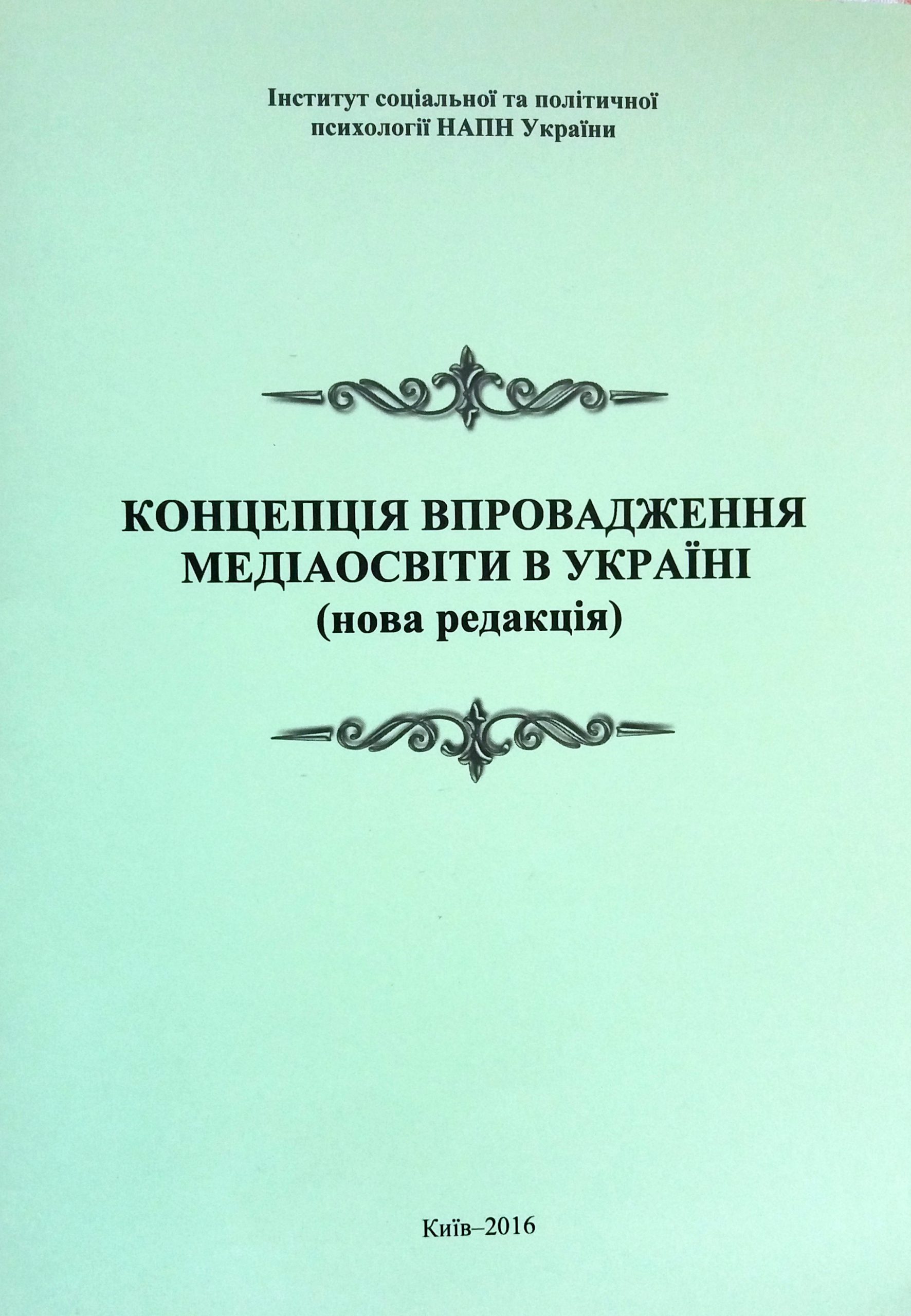 Naydonova, L.A., Slyusarevskyy, M.M. (eds). (2016). Concept of Implementation of Media Education in Ukraine (new edition). Kyiv. The Institute for Social and Political Psychology of NAESU. (Ukr.)
Naydonova, L.A., Slyusarevskyy, M.M. (eds). (2016). Concept of Implementation of Media Education in Ukraine (new edition). Kyiv. The Institute for Social and Political Psychology of NAESU. (Ukr.)
Approved by the Presidium of the National Academy of Pedagogical Sciences of Ukraine on April 21, 2016
The main goal of the Concept is to promote the development of an effective media education system in Ukraine in order to ensure comprehensive training of children and youth for safe and effective interaction with the modern media system, the formation of media information literacy and media culture in accordance with their age and individual characteristics, which provides the foundation of information security the state in resisting aggressive external informational influences and propaganda. The concept is aimed at preparing and conducting a large-scale phased experimental and subsequent mass introduction of media education into pedagogical practice at all levels; priority initiation of school media education, which will become the main integration link in the formation of a complete system of media education; provision of media education in higher education, primarily during the training of pedagogical professionals; taking into account the tasks of media education during the implementation of educational reforms and planning the corresponding budget allocations; initiation of broad public support for the media education movement, including international cooperation in this area. The National Academy of Educational Sciences of Ukraine is responsible for knowledge leading the implementation of media education in the country. The Concept contains the main terms, goals, tasks and priorities of the development of media education in Ukraine, the main principles and forms of media education, directions, stages and conditions for the implementation of the Concept.
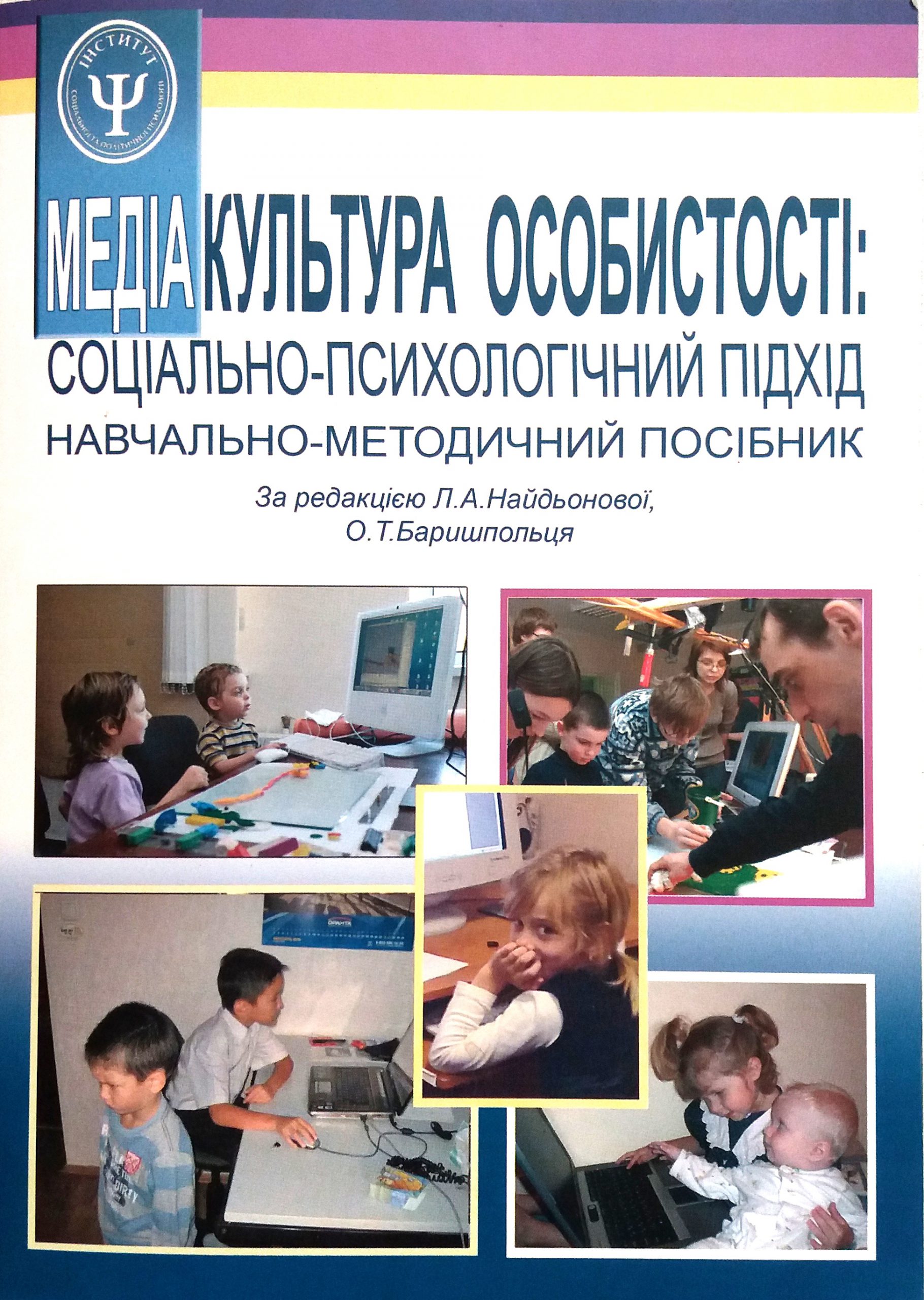 Naydonova, L.A., Baryshpolets, O.T. (eds.). (2009). Media culture of personality: socio-psychological approach. Handbook. K. Millennium. (Ukr.)
Naydonova, L.A., Baryshpolets, O.T. (eds.). (2009). Media culture of personality: socio-psychological approach. Handbook. K. Millennium. (Ukr.)
The handbook analyzes in detail the contradictory influence that the modern information space has on a person. The socio-psychological mechanisms of interaction between the producer and the consumer of information in the conditions of the Ukrainian media space, the advantages and dangers of watching cartoons by children, using the Internet, etc. are revealed. On the basis of the latest media psychological research, the real state of the media culture of Ukrainian youth is characterized. The experience of media education in other countries is summarized, a domestic model of media education and an experimental program of the “Media Culture” course for high school students are evidence suggested, and practical materials and methods are collected. The manual is intended for use by teachers as working material for preparing and conducting media education classes with senior secondary school students and organizing other forms of media education with children of different ages. It will be useful for teachers, psychologists, parents, and everyone who is interested in the issues of the psychology of mass communication and media education.
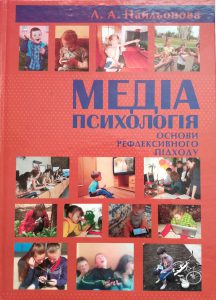 Naydonova, L.A. (2015). Media Psychology: the Principles of a Reflexive Approach. Textbook. National Academy of Educational Sciences of Ukraine, Institute of Social and Political Psychology. – second ed., Kirovohrad: Imex-LTD. (Ukr.)
Naydonova, L.A. (2015). Media Psychology: the Principles of a Reflexive Approach. Textbook. National Academy of Educational Sciences of Ukraine, Institute of Social and Political Psychology. – second ed., Kirovohrad: Imex-LTD. (Ukr.)
The experimental textbook contains the necessary volume of information and methodical material for training teachers on the topics of psychological impact of modern media and reflexive methods of mastering the most acute challenges of the information society. Reflection is interpreted as a rethinking, that is, a restructuring of the system of meanings that combine the interaction of different subjects. Studying the course of media psychology based on a reflexive approach is considered as a necessary component of the development of a teacher’s media competence. The book can be useful to all specialists involved in the media education of children and youth, school psychologists, students of the postgraduate pedagogical education system, future journalists, as well as parents and a wide range of readers interested in understanding the psychological phenomena of the information space.
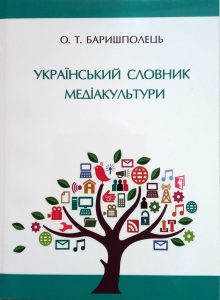 Baryshpolets, O. T. (2014). Ukrainian Dictionary of Media Culture. National Academy of Pedagogical Sciences of Ukraine, Institute of Social and Political Psychology. K.: Millennium. (Ukr.)
Baryshpolets, O. T. (2014). Ukrainian Dictionary of Media Culture. National Academy of Pedagogical Sciences of Ukraine, Institute of Social and Political Psychology. K.: Millennium. (Ukr.)
The dictionary is the first time book in Ukraine, which attempts to give an interpretation of the terms that have arosed in connection with the globalization processes of the development of the information society. The number and specificity of terms determined the structure of the dictionary. It consists of three sections: “Media Culture of the Individual and Society”, “Internet and Cyber Culture”, “Media Psychology and Media Education”, which combine the conceptual apparatuses of these branches of social life. It is intended primarily for teachers of school and university courses “Media Culture”, senior secondary school students, university students who study this course, as well as journalists, psychologists, wide circles of the pedagogical community.
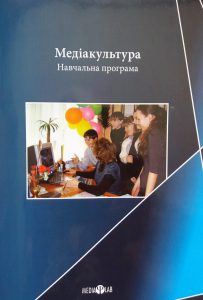 Naidyonova, L.A., Cherepovskaya, N.I. (2018). Media Education Program as the Elective Course “Media Culture” for students of grades 9, 10, 11 of secondary education schools (three years of study). Kyiv. The Institute for Social and Political Psychology of NAESU. (Ukr.)
Naidyonova, L.A., Cherepovskaya, N.I. (2018). Media Education Program as the Elective Course “Media Culture” for students of grades 9, 10, 11 of secondary education schools (three years of study). Kyiv. The Institute for Social and Political Psychology of NAESU. (Ukr.)
The program consists of four content modules dedicated to media literacy, cyber culture, audiovisual and general information culture. The purpose of studying the “Media Culture” course in senior classes is to increase the resourcefulness of media practices, prevent media abuse, and promote the formation of mechanisms of self-regulation of interaction with the media. The program meets the age needs of high school students, takes into account the experience of testing in the all-Ukrainian experiment of the previous course for 10th graders, provides a high degree of variability at the discretion of the teacher, determining the key results of the course study. The implementation of the curriculum will contribute to the development of media culture of high school students, professional and civic self-determination, health preservation in stressful situations caused by media influences and life situations. Addressed to media educators, psychologists, parents; can be useful for students of pedagogical and psychological specialties, high school students, and all interested users. http://mediaosvita.org.ua/book/navchalna-programa-mediakultura/
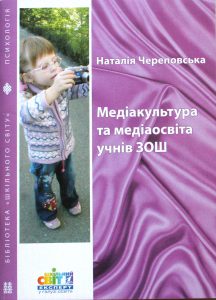 Cherepovska, N. I. (2010). Media Culture and Media Education of Secondary School Students. Visual Media Culture. K., School World Publishing House.
Cherepovska, N. I. (2010). Media Culture and Media Education of Secondary School Students. Visual Media Culture. K., School World Publishing House.
The book “Media Culture and Media Education of Secondary School Students. Visual Media Culture” is one of the first attempts in Ukraine of manual to give students a system of knowledge and practical skills for navigating today’s information flows: finding, assimilating, applying the necessary information; adequate perception, critical understanding, liberation from unnecessary information and creative interpretation of various media productions. “Media Culture and Media Education of Secondary School Students. Visual Media Culture” is an experimental version of a special course for senior secondary school students.
Methodological and practical material is presented here for media educators, teachers, social educators, school psychologists, parents and all those who care about the future of the young generation in the new conditions of the information society.
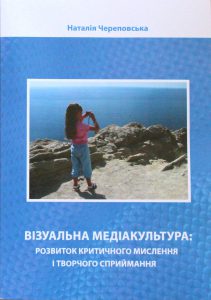 Cherepovska, N. I. (2014). Visual Media Culture: Development of Critical Thinking and Creative Perception. Methodical recommendations for the media education course “Media Culture” for senior secondary school students. K., MILENIUM. (Ukr.)
Cherepovska, N. I. (2014). Visual Media Culture: Development of Critical Thinking and Creative Perception. Methodical recommendations for the media education course “Media Culture” for senior secondary school students. K., MILENIUM. (Ukr.)
The methodological recommendations of the course “Visual Media Culture: Development of Critical Thinking and Creative Perception” correspond to one of the modules of the program of the optional course for students of the 10th grade of general educational institutions “Media Culture”, created by the laboratory of psychology of mass media communication and media education of the Institute for Social and Political Psychology of the National Academy of Educational Sciences of Ukraine, and are aimed at optimizing the implementation and teaching media education courses on media culture and media literacy for senior secondary school students. The purpose of the methodological recommendations is to guide the work of media educators in the process of forming students’ visual media culture and developing their critical thinking and creative perception in the conditions of modern visual media reality.
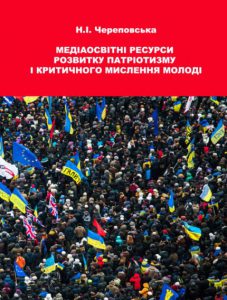 Н.І. Череповська // Національна академія педагогічних наук України, Інститут соціальної та політичної психології. – Кропивницький : Імекс-ЛТД, 2017. –156 с.
Н.І. Череповська // Національна академія педагогічних наук України, Інститут соціальної та політичної психології. – Кропивницький : Імекс-ЛТД, 2017. –156 с.
У навчально-методичному посібнику пропонуються способи оптимізації процесу виховання патріотизму у старшокласників, студентів та розвитку їхньої медіаграмотності засобами медіаосвіти. Автор посібника висуває ідею ресурсності патріотизму особистості в умовах інформаційної війни та збагачення його такими новими інструментальними якостями, як свідоме ставлення до інформації, здатність до рефлексії емоцій, почуттів щодо сприйнятого, спроможність критично осмислити інформацію і зробити самостійні висновки, творчо переосмислити повідомлення та ін. До уваги педагогів подаються навчальні матеріали, методичні і практичні рекомендації щодо прищеплення молоді почуття патріотизму та розвитку її медіаграмотності. Крім теоретичних розробок, представлено програму і методику виховання патріотизму засобами медіа «Я – патріот», а також опис технологій розвитку нових якостей патріота, притаманних цифровій добі й особливо актуальних в умовах інформаційної війни. Адресується вчителям, медіапедагогам, психологам, викладачам, соціальним педагогам/працівникам, батькам і всім тим, хто цікавиться темою сучасного українського патріотизму.
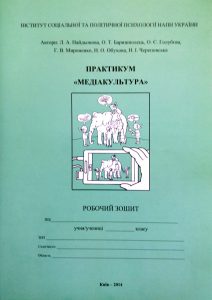 Л. А.Найдьонова, О. Т. Баришполець, О. Є. Голубєва, Мироненко Г.В., Найдьонова Л.А., Обухова Н.О., Череповська Н.І.; наук. ред. Л. А.Найдьонова ; Ін-т соц. та політ. психології НАПН України. – К., 2013. – 100 с.
Л. А.Найдьонова, О. Т. Баришполець, О. Є. Голубєва, Мироненко Г.В., Найдьонова Л.А., Обухова Н.О., Череповська Н.І.; наук. ред. Л. А.Найдьонова ; Ін-т соц. та політ. психології НАПН України. – К., 2013. – 100 с.
Практикум «Медіакультура» є експериментальним дидактичним комплексом теоретико-практичних завдань для самостійної індивідуальної та групової роботи учнів. Комплекс призначений для практичного засвоєння курсу за вибором для учнів 10 класу загальноосвітніх навчальних закладів «Медіакультура».
До робочого зошиту включено творчі завдання, питання для дискусії, завдання для самооцінки учнем власних знань, умінь і навичок, набутих у ході вивчення курсу, цікаві факти, довідкові та статистичні матеріали, що можуть бути корисними для виконання практичних завдань.
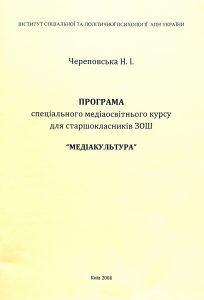 Череповська Н.І. – Інститут соціальної та політичної психології НАПН України. – Київ, 2008. – 28 с.
Череповська Н.І. – Інститут соціальної та політичної психології НАПН України. – Київ, 2008. – 28 с.
Програма курсу «Медіакультура» ґрунтується на теоретичних засадах і практичних здобутках вітчизняної психології, зарубіжної медіапсихології й психології медіаосвіти. Засадничим принципом ідеї медіа-освіти у школі є надання учням теоретичних знань про ЗМК, формування умінь критичного ставлення до медіа-продукції загалом та практичних навичок, спрямованих на пошук потрібної медіа-інформації, дистанціювання від непотрібної, створення власних медіа-текстів.
Відповідно структура програми має вступ, чотири розділи: теоретичний, дослідницький, практичний творчий, післямову.
Методичне забезпечення курсу становить:лекційний матеріал, методи дослідження медіатексту, методи і прийоми пошуку інформації, профілактичні захисні методи, а також методи стимулювання продуктивної медіатворчості і творчого медіасприймання зокрема.
Програма орієнтована на медіапедагогів, учителів, шкільних психологів, соціальних педагогів.
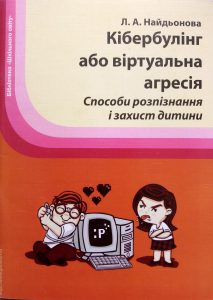 Л. А. Найдьонова; упорядник В.О. Снігульська. – К.: Редакції загальнопедагогічних газет, 2014. – 96 с. (Бібліотека “Шкільного світу”)
Л. А. Найдьонова; упорядник В.О. Снігульська. – К.: Редакції загальнопедагогічних газет, 2014. – 96 с. (Бібліотека “Шкільного світу”)
Кібербулінґ – це новітня форма агресії, що передбачає жорстокі дії з метою дошкулити, нашкодити, принизити людину з використанням інформаційно комунікаційних засобів: мобільних телефонів, електронної пошти, соціальних мереж тощо.
Методичні рекомендації присвячено проблемі виявлення в дитячому середовищі ситуацій кібербулінґу, порівняння їх із ситуаціями фізичного цькування і психологічного терору без опосередкування новітніми технологіями.
Роз’яснюються причини виникнення цих негативних явищ, пропонуються способи подолання і напрями профілактики.
Приділено увагу правилам проведення бесід з батьками тих дітей, що потрапили в ситуацію жертви, стали кібер-булерами (переслідувачами), або мимовільно були втягнуті в процес як учасники чи свідки.
Може бути корисна вчителям загальноосвітніх шкіл, методистам міських (районних) методкабінетів, шкільним психологам і соціальним педагогам, іншим фахівцям, що працюють з дітьми, підлітками та старшокласниками, батькам і всім зацікавленим дорослим.
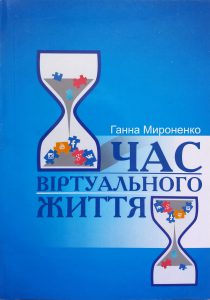 Г.В. Мироненко; Національна академія педагогічних наук України, Інститут соціальної і політичної психології. – К.: Імекс-ЛТД, 2015. – 134 с.
Г.В. Мироненко; Національна академія педагогічних наук України, Інститут соціальної і політичної психології. – К.: Імекс-ЛТД, 2015. – 134 с.
У монографії представлено проблему «віртуалізації» як нового способу адаптації свідомості сучасної людини до медіатизованого інтернетизованого простору.
Аналізуються специфічні просторово-часові характеристики віртуальної реальності. У контексті темпорально-мотиваційної моделі адаптації людини у віртуальному просторі презентуються результати експериментального дослідження особливостей модифікації часових уявлень медіакористувачів.
Окреслено шляхи конструктивно-творчої адаптації людини у віртуальному світі, пропонуються способи і методи ефективної та безпечної її взаємодії із сучасними мультимедійними технологіями.
Для науковців, викладачів, студентів і аспірантів у галузі психології, практичних психологів системи освіти та всіх,хто цікавиться проблемами взаємодії людини з медіа в сучасному суспільстві.
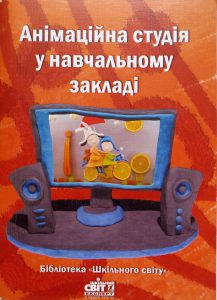 Олена Голубєва. – К. : Шкільний світ, 2012. – 93 с. : рис. – (Бібліотека “Шкільного світу”)
Олена Голубєва. – К. : Шкільний світ, 2012. – 93 с. : рис. – (Бібліотека “Шкільного світу”)
Навчально-методичний посібник, який розкриває основні ознаки сучасного світу медіа, механізми масового залучення до них людей, походження віртуально-екранного світу та основні його закономірності.
Найбільша цінність цієї розробки полягає в описанні різних форм роботи з дітьми:це і комплексна програма студії мультиплікації, яка може бути використана для шкільної кіностудії, це і майстер-класи для позакласної форми роботи з дітьми середнього шкільного віку, це і медіаклуб для старшокласників.
Автор представляє багаторічну роботу анімаційної студії, як досвід інтеграції різних форм роботи учнів з медіа, а також як таку, що здатна розкрити творчий потенціал дитини.
Включено медіа-освітню програму для позашкільних навчальних закладів.
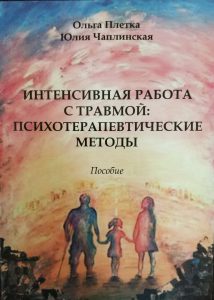 Ольга Плетка, Юлия Чаплинская. – К. : Талком, 2017. – 232 с.
Ольга Плетка, Юлия Чаплинская. – К. : Талком, 2017. – 232 с.
В своей профессиональной деятельности психологи и психотерапевты соприкасаются с различными психологическими травмами, преодоление клиентом которых и будет определять успешность работы специалистов.
В методическом пособии раскрыты основы и особенности работы с травмой специалистов в разных психологических парадигмах.
Описаны методы оказания помощи, этапы работы и особенности понимания природы травмы в арт-терапии, транзактном анализе и нарративном подходе.
Представлена подборка методик и техник практической направленности для работы с последствиями психологической травмы.
Пособие рассчитано на специалистов помогающих профессий, волонтеров, работающих с клиентами, пережившими травмирующий опыт.
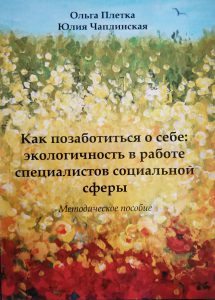 О. Т. Плетка, Ю. С. Чаплинская. – К.: Университет “Украина”, 2016. – 114 с.
О. Т. Плетка, Ю. С. Чаплинская. – К.: Университет “Украина”, 2016. – 114 с.
Профессиональная деятельность специалистов сферы сопряжена со многими подводными камнями в практической деятельности.
Методическое пособие посвящено процессам регуляции и саморегуляции деятельности с целью профилактики эмоционального истощения и оказания помощи и самопомощи при нестабильном эмоциональном состоянии или чувстве беспомощности.
Описаны особенности работы с вынужденными переселенцами, бойцами и ветеранами АТО.
Представлены авторские методики работы по профилактике профессионального выгорания. Методическое пособие рассчитано на широкий круг интереса со стороны специалистов социальной сферы.
Досліджуються психологічні аспекти актуальної суспільно-політичної ситуації в країні, зокрема питання загальнонаціональної консолідації, розбудови громадянського суспільства, євроінтеграції та демократизації, соціальних процесів, що відбуваються в умовах зовнішньої воєнної агресії проти України. Аналізуються психологічні чинники формування та вияву громадянської ідентичності, політико-правової компетентності, патріотичних почуттів та ціннісних вимірів політичної свідомості українців.
«Медіатравма в умовах інформаційної війни: психологічний та педагогічний аспекти» [Електронний ресур] / Матеріали І Всеукраїнської наукової конференції (м. Київ, 20–21 червня 2017 р.) // mediaosvita.org.ua.– 2017 – Режим доступу до ресурсу: http://mediaosvita.org.ua/book/materialy-vseukrayinskoyi-naukovo-praktychnoyi-konferentsiyi-mediatravma-v-umovah-informatsijnoyi-vijny-psyhologichnyj-ta-pedagogichnyj-aspekty/
